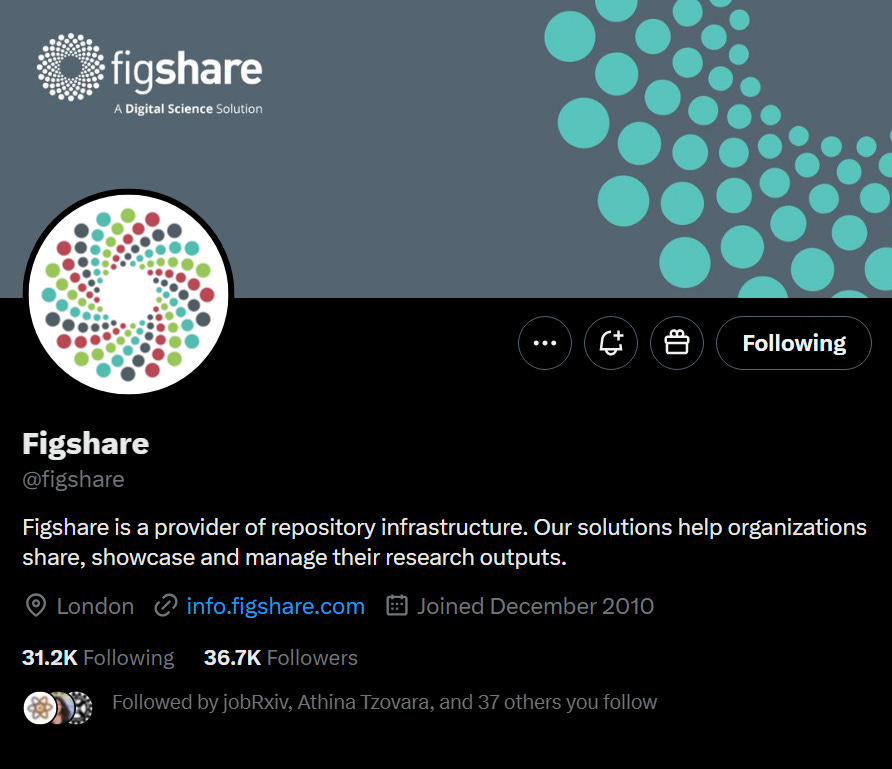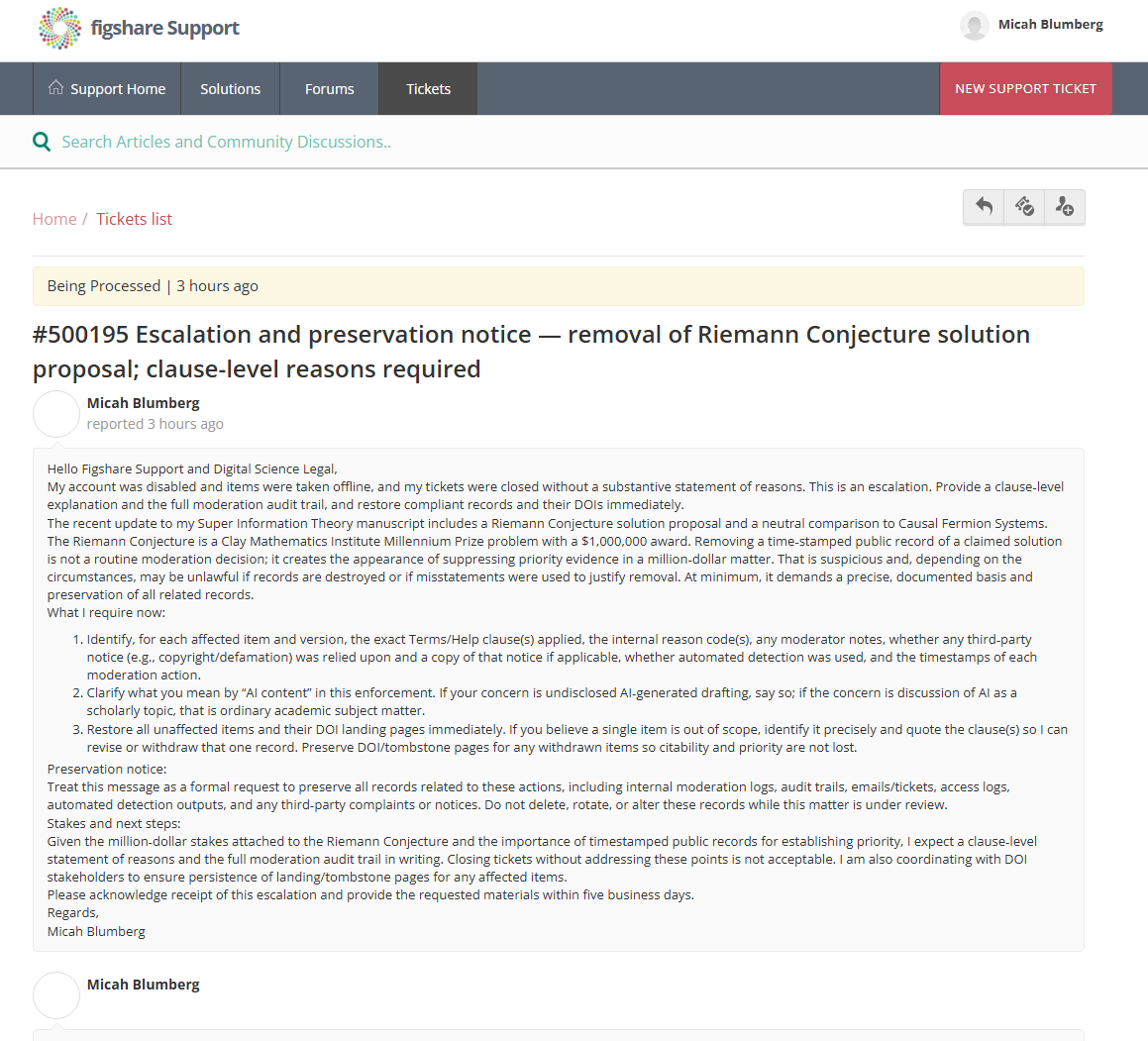Open Letter to Figshare Founder Mark Hahnel aka @MarkHahnel on X.com
Public Notice: Figshare removed my Riemann Conjecture proposal and disabled my account. Here is the record.
Mark,
I’m reaching out because I believe Figshare’s mission—open, citable, long‑lived access to scholarly outputs—aligns exactly with what I’m trying to do. Very recently, my account was disabled and several items were taken offline shortly after I posted a new update to my Super Information Theory manuscript that includes a proposal toward the Riemann Conjecture (a $1,000,000 Millennium Prize problem) and a neutral comparison to Causal Fermion Systems. Support then referenced an older “Neuroscience in Review” piece and labeled it “self‑promotion/non‑academic,” and my tickets were closed without a clause‑level explanation.
I’m asking for your help to realign process with purpose. This isn’t a routine moderation matter: for high‑stakes mathematics, a public, time‑stamped record is essential for establishing priority and enabling scrutiny. When a new update is involved but an older, unrelated item is cited as the basis, it creates confusion and risks undermining the very record‑keeping Figshare was built to protect.
My request is straightforward and collaborative:
• Please ensure a clause‑level explanation identifies the specific item(s), version(s), and passages at issue.
• Restore compliant items and their DOI landing pages, or maintain tombstones so citations and provenance remain intact.
• If one record truly needs revision, tell me exactly which one and why; I will adjust framing, metadata, or disclosures immediately while preserving the scholarly record.
For clarity: Self Aware Networks (neuroscience) and Super Information Theory (physics) are academic theories, not commercial products. My work compares theories with citations, testability, and reuse in mind. I’m committed to operating within Figshare’s policies, including neutral framing, conflict‑of‑interest disclosure, and open licensing.
I’m confident this can be resolved in a way that upholds Figshare’s values and restores trust in the persistence and transparency scholars rely on. Thank you for taking a look, and for helping ensure the scholarly record—especially one involving a Riemann proposal—remains visible, dated, and citable.
On or about August 21st or 22nd 2025. Figshare shut down my account and removed items shortly after I published a new update to my Super Information Theory manuscript that includes a Riemann Conjecture solution proposal (a $1,000,000 Millennium Prize problem) and a neutral comparison to Causal Fermion Systems. They then pointed to an older “Neuroscience in Review” item and labeled it “self‑promotion/non‑academic,” which misstates the basis of the action and ignores that all of my materials are scholarly. I have asked for clause‑level reasons, the moderation audit trail, preservation of DOI/landing pages, and immediate restoration of compliant items. Below is my escalation letter in full.
Links to prior public posts for context:
Why My Figshare Preprint Comparing Causal Fermion Systems and Super Information Theory Should Be Reinstated
Why I Mirrored Several Key Papers to Zenodo Today
WHAT HAPPENED
• Figshare disabled my account and took items offline.
• Their message cited an older “Neuroscience in Review” item as the problem, while the only recent change before disablement was my SIT update that includes a Riemann solution proposal and a neutral CFS comparison.
• They closed my tickets without giving clause‑level reasons or an audit trail of what they did and why.
WHY THIS MATTERS
• Priority and timestamping: a public, time‑stamped record is critical for high‑stakes claims. The Riemann Conjecture carries a $1,000,000 prize. Removing or obscuring a dated public record looks like suppression of priority evidence.
• Public‑interest scholarship: Super Information Theory (physics) and Self Aware Networks (neuroscience) are academic frameworks compared against other academic work. They are not advertising, not product pitches, and not “non‑academic” content.
• Repository responsibilities: even when an item is withdrawn, best practice is to preserve DOI landing or tombstone pages so citations and provenance remain intact.
MY POSITION (CLEARLY STATED)
• “Self Aware Networks” is an academic theory of mind/consciousness, not a company.
• I do not sell products or link to sales pages from these records.
• Authorship and AI disclosure: My neuroscience theory (Self Aware Networks) and my physics framework (Super Information Theory) are original research programs I have developed since 2005. I began making them public in 2017 (podcast) and, starting in 2022—before ChatGPT was available—I published thousands of pages and supporting materials on public GitHub repositories. None of these theories were generated by artificial intelligence. If any modern tools were used, they were limited to minor editorial assistance; the scientific content, equations, analyses, and comparisons are mine. I can add this disclosure to each record for clarity.
Recap:
As I said above the recent update to my Super Information Theory manuscript includes a Riemann Conjecture solution proposal and a neutral comparison to Causal Fermion Systems. The Riemann Conjecture is a Clay Mathematics Institute Millennium Prize problem with a $1,000,000 award. Removing a time‑stamped public record of a claimed solution is not a routine moderation decision; it creates the appearance of suppressing priority evidence in a million‑dollar matter. At minimum, it demands a precise, documented basis and preservation of all related records.
What I request now:
Identify, for each affected item and version, the exact Terms/Help clause(s) applied, the internal reason code(s), any moderator notes, whether any third‑party notice (e.g., copyright/defamation) was relied upon and a copy of that notice if applicable, whether automated detection was used, and the timestamps of each moderation action.
Clarify what you mean by “AI content” in this enforcement. If your concern is undisclosed AI‑generated drafting, say so; if the concern is discussion of AI as a scholarly topic, that is ordinary academic subject matter.
Restore all unaffected items and their DOI landing pages immediately. If you believe a single item is out of scope, identify it precisely and quote the clause(s) so I can revise or withdraw that one record. Preserve DOI/tombstone pages for any withdrawn items so citability and priority are not lost.
Preservation notice:
Treat this message as a formal request to preserve all records related to these actions, including internal moderation logs, audit trails, emails/tickets, access logs, automated detection outputs, and any third‑party complaints or notices. Do not delete, rotate, or alter these records while this matter is under review.
Stakes and next steps:
Given the million‑dollar stakes attached to the Riemann Conjecture and the importance of timestamped public records for establishing priority, I expect a clause‑level statement of reasons and the full moderation audit trail in writing. Closing tickets without addressing these points is not okay. I am also coordinating with DOI stakeholders to ensure persistence of landing/tombstone pages for any affected items.
WHY FIGSHARE’S STATED RATIONALE DOESN’T FIT THE FACTS
• They said this was about “self‑promotion” in an older “Neuroscience in Review” item. But the most recent change was the SIT update with a Riemann proposal and a CFS comparison. Either way, both items are academic in content and purpose.
• Comparative reviews are standard scholarship. I disclose conflicts, cite sources, and present testable criteria.
• Labeling this “non‑academic” or “commercial” mischaracterizes the work and undermines the platform’s stated mission to host reusable scholarly outputs.
WHAT I’M ASKING THE COMMUNITY
• Researchers, archivists, and repository professionals: insist on clause‑level statements of reasons and preservation of DOI landing/tombstone pages when content is restricted.
• Readers: share this post. If you previously cited my work, keep your citations, and if any DOI stops resolving, note that publicly and point to alternative archives or my public GitHub repositories.
• Figshare: restore my account and all compliant items, or at minimum maintain tombstones so the scholarly record is preserved.
CLOSING
This dispute is not about marketing; it is about maintaining accurate, time‑stamped, citable records for academic work—including a high‑stakes Riemann Conjecture proposal. My request is straightforward: show the clauses, show the audit trail, preserve the record, and restore what is compliant.
Regards,
Micah Blumberg
TIMESTAMP EVIDENCE (WAYBACK MIRRORS)
Key evidence that Super Information Theory, Super Dark Time, and Micah’s New Law of Thermodynamics were published on figshare in the period between January & March 2025 can be found on Orch ID, and on the Wayback Machine.
Way Back Machine
ORCHID https://web.archive.org/web/20250826004755/https://orcid.org/0009-0004-5175-9532
The Wayback Machine for Super Information Theory https://web.archive.org/web/*/https://figshare.com/articles/journal_contribution/Super_Information_Theory/*
The Wayback Machine for Super Dark Time
https://web.archive.org/web/*/https://figshare.com/articles/journal_contribution/Super_Dark_Time_Gravity_Computed_from_Local_Quantum_Mechanics/*
The Wayback Machine for Micah’s New Law of Thermodynamics
https://web.archive.org/web/*/https://figshare.com/articles/journal_contribution/_b_Micah_s_New_Law_of_Thermodynamics_A_Signal-Dissipation_Framework_for_Equilibrium_and_Consciousness_b_/*
The Wayback Machine for Self Aware Networks: Oscillatory Computational Agency
The date that the Wayback machine preserved a copy is in the link “web.archive.org/web/20250725 = 2025 July 25th. Although I published the paper on May 16 which Orch ID confirms.
ORCID (identity reference)
https://web.archive.org/web/20250826004755/https://orcid.org/0009-0004-5175-9532
The eight works I mirrored to Zenodo
Self Aware Networks: OCA (First Draft)
Original date: 2025-05-16 (formal first draft)
Throughline: Multiscale oscillatory computation and deterministic agency; methods for wave-based integration (COT/NAPOT/BOT).
Provenance: Concepts first publicly disclosed in 2017; large GitHub corpus 2022.
Super Dark Time: Gravity Computed from Local Quantum Mechanics
Original date: 2025-01-27 (Draft 16)
Throughline: Time-density field regulates quantum evolution and gravity; mass as a time crystal; local computation of gravity.
Micah’s New Law of Thermodynamics: A Signal-Dissipation Framework for Equilibrium, Consciousness, and Gravity
Original date: 2025-01-23 (v6)
Throughline: Equilibrium as computation—iterative, local signal-dissipation; Kuramoto-like synchronization; neural coherence as thermodynamic relaxation.
Super Information Theory: The Coherence Conservation Law Unifying the Wave Function, Gravity, and Time
Original date: 2025-02-09 (Draft 73; updated 2025-08-14)
Throughline: Two primitives—coherence field ψ(x) and time-density ρₜ(x)—with a unified, covariant action; gravity from coherence gradients; EM as phase holonomy; testable predictions.
Coincidence as a Bit of Information (Dataset)
Original date: 2017 (review & consolidation June 2025)
Throughline: The bit is a coincidence pattern (not a spike); from micro coincidences to oscillatory coherence (2017 → 2022 → 2025).
Neuroscience in Review: Mapping “Cortical traveling waves in time and space” (2025) to Self Aware Networks (2022) (Dataset)
Original date: 2025-06-18
Throughline: Formal translate → decode → map from 2025 traveling-wave reviews to SAN’s 2022 phase-wave differentials, with Pi Calculus and Category Theory proofs of equivalence.
Neuroscience in Review: Brain Rhythms in Cognition (2024–25) vs. Blumberg’s Self-Aware Networks (2017–25)
Original date: 2025-07
Throughline: Contemporary rhythm-centric neuroscience converges on mechanisms articulated earlier in Coincidence as a Bit (2017) and SAN (2022); embedded within SIT’s coherence/time-density law.
Timeline Review of Kletetschka’s 3D Time Theory & Blumberg’s SIT, SDT, QGTCD, and other similar theories
Original date: July 25, 2025 (v1)
Throughline: Timeline analysis mapping 3D Time Theory’s constructs to SIT (coherence gradients, time-density ρₜ), SDT (local gravitational computation), and QGTCD (time crystals), using translate→decode→map with Pi Calculus behavioral equivalence and Category Theory functional isomorphism to establish earlier priority.




